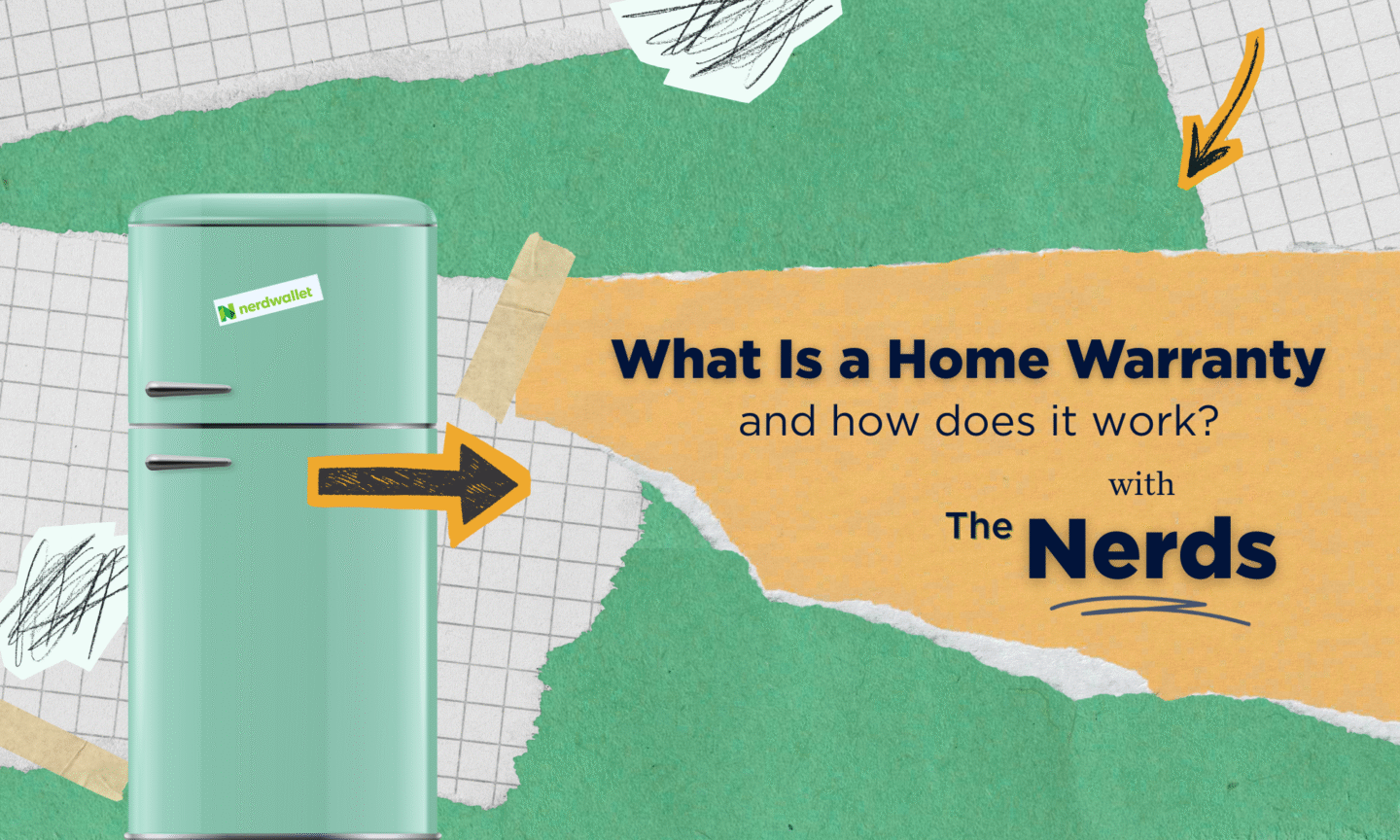The Nerds Explain Home Warranties
Home warranty plans cover some home systems and appliances, but you'll still pay certain costs for repairs.

Some or all of the mortgage lenders featured on our site are advertising partners of NerdWallet, but this does not influence our evaluations, lender star ratings or the order in which lenders are listed on the page. Our opinions are our own. Here is a list of our partners.
A home warranty is a plan that pays part of the costs to repair or replace some of your home's major systems and appliances. It covers different things and scenarios than homeowners insurance, and it’s not the same as a manufacturer warranty.
Think of it like an extended warranty you would buy for your car, but for your refrigerator and washing machine.
You’ll pay a yearly or monthly plan fee, and a service fee every time a technician comes to your house. How much you pay and what’s covered depends on the company you go with and the plan you choose.
A home warranty might save you money if the company agrees to pay for a repair, but denied claims can cost you more in the long run than if you’d paid for repairs on your own.
To get the most out of a homeowner warranty, it's important to read the fine print so you understand what's covered and how the plan works before signing up.
On this page
- Find your next steps
- What a home warranty covers
- Limits on home warranty coverage
- How much you’ll pay for a home warranty
- 💰 How much will a home warranty save you on repairs?
- How a home warranty works
- What to consider when choosing a home warranty
- Alternatives to a home warranty
- Frequently Asked Questions
What a home warranty covers
Home warranties usually pay to repair appliances and major home systems. Most companies offer at least some of the three most common types of plans:
- System plans cover major home systems, including heating and cooling, electrical and plumbing.
- Appliance plans cover major appliances, such as a dishwasher, oven and washing machine.
- Combination plans cover major systems and appliances. These are sometimes offered as different levels of coverage, with the more expensive plans offering a greater range of coverage.
Not all companies cover the same items, and how items are grouped together can vary between companies. For example, Choice Home Warranty covers a garbage disposal in both of its plans, but American Home Shield covers one in only two of its three plans. And Home Warranty of America doesn’t cover a garbage disposal at all in its plans.
Home warranty companies often have optional coverage, sometimes called add-ons, that let you tack on extra items that your plan doesn’t cover. Examples of common add-ons are in-ground sprinkler systems, swimming pools and septic systems. You have to pay extra to cover these items, which increases your monthly cost.
✏️ A Nerdy Note
A “home warranty” isn’t a warranty. It’s actually a service contract — an agreement for the company to repair your items for a monthly fee, similar to a subscription . Homeowner warranties are not homeowners insurance policies either . Although home warranties can make homeowners feel more comfortable with home maintenance costs, home warranties are never a replacement for home inspections or homeowners insurance.
What a home warranty doesn’t cover
Home warranties usually only pay for repairs caused by normal wear and tear. Common issues they don’t cover include:
- Structural issues, such as foundation problems.
- Damage caused by natural disasters such as floods or hurricanes.
- Issues that are the result of human error or improper maintenance.
- Cosmetic issues that don’t affect how the item works.
- Rust, corrosion or sediment that has caused an appliance or system to fail.
- Pre-existing conditions or failures caused by improper installation or modification.
- Issues that are covered by a manufacturer’s warranty.
Home warranties often won’t pay for certain parts or types of repairs. For example, if you have a plan with Liberty Home Guard, the company will cover the cost of fixing clogged drains but only if they can be cleared with certain equipment. If a plumber can’t clear a drain using those tools, the company won’t pay to fix the problem.
It’s important to know what a plan will cover before signing a contract. A reputable home warranty company will provide you with these details before expecting you to make a decision.
Learn more about home warranty coverage in our article “What does a home warranty cover?”
Limits on home warranty coverage
Most home warranty companies have a coverage limit, which is the most it will pay to repair or replace a certain item during the plan term. If a repair or replacement costs more than a coverage limit, you’ll probably have to pay whatever the company won’t pay to finish the repair.
Coverage limits vary between companies and with different types of repairs. For example, compare the different coverage limits for air conditioning systems for the companies in the table below.
The coverage limits in the table above range from $2,000 to $6,500 for air conditioning system repairs, depending on the company you choose to go with.
Some companies combine coverage limits for several items. For example, Choice Home Warranty’s coverage limit is $3,000 for all HVAC repairs, which means the cost of repairs for air conditioning systems, heating systems and ductwork all count toward that limit.
Many home warranty companies also have a limit for how much they’ll pay for repairs or replacements during a contract term. This is called an aggregate limit. For example, American Home Shield won’t pay more than $50,000 total for repairs or replacements during a 12-month contract. Compare that to Cinch Home Services, which only pays up to $10,000 during a 12-month contract.
Advertisement
How much you’ll pay for a home warranty
A home warranty usually charges two fees before a repair is approved. You’ll pay these fees even if your claim is denied and the company refuses to pay for a repair.
Monthly fee
A monthly fee is the cost just to be covered by a plan. You’ll pay this fee regardless of how many claims you have. That means you’ll be out of pocket this much even if you never use your home warranty.
In this way, you can think of the monthly fee like a gym membership: It’s going to be deducted from your checking account no matter how much you do (or don’t) workout.
The average home warranty plan costs $62.33 per month, according to NerdWallet’s analysis. Plans can range from about $30 per month to about $120 per month, depending on the company, plan and the property location.
Service fee
A service fee is the cost to have a repairperson look at your failing appliance or system. You’ll pay this fee whenever your home warranty company schedules someone to come to your house, and you usually have to pay it before the technician diagnoses the problem.
This fee is similar to what you’d pay if you hired your own repair company. Many repair companies charge a call-out or service fee to diagnose an issue so they make at least some money on the call if you decide not to have them fix it.
However, many repair companies will apply the service fee to your repair bill if you do have them repair something, which means you don’t actually pay that money in the end. Home warranties don’t do that — you’re out that money whether or not the repairperson fixes the issue.
Service fees can range from $65 to $150 for each service call. If you have several claims throughout your service agreement's term, you could pay several hundred dollars on top of your 12 monthly fees.
See more about the cost of home warranties in our article “How much does a home warranty cost?”
💰 How much will a home warranty save you on repairs?
The short answer: There’s no way to know.
You might save money with a home warranty if a company agrees to pay for repairs. You’ll always pay a monthly fee plus a service fee, which might be cheaper together than having to pay out of pocket for a repair.
But a home warranty plan isn’t guaranteed to pay every claim.
For example, depending on your location and type of air conditioning unit, a replacement compressor could cost you between $800 and $3,000, depending on your location and type of unit. If your home warranty plan covers the full replacement of the compressor, you might only be responsible for a $65 monthly fee and the $100 service fee.
But if your plan limits how much the company pays for air conditioning repairs, which is common, you’ll also have to pay any leftover charges after your plan reaches its limit. Let’s say your plan will pay up to $1,000 for air conditioner repairs. With a $1,200 bill for repairs, you’d have to pay the monthly fee, service fee and remaining $200 balance.
In this example, you’d pay $365 to replace your compressor even though your plan covered the repair.
In this scenario, your home warranty plan can save you money, but you’d still have to pay the monthly fee and service fee before you knew if your plan would pay for the repair. So if your home warranty plan denied your claim, you’d be out $165 in addition to the out-of-pocket cost of $1,200 to replace your compressor.
How a home warranty works
Most home warranties follow the same basic steps:
- When a covered item in your home stops working, you submit a claim with your home warranty company.
- The company schedules a repair technician to come to your house. How long you have to wait for an appointment depends on the home warranty company and the technician’s availability.
- A technician visits your home to figure out what’s wrong with your system or appliance. The repairperson determines if you need a repair or replacement. Then they submit a report to the home warranty company.
- Your home warranty provider reviews the report and approves or denies your claim.
If the home warranty company approves the claim, the company will pay the technician to repair the item. You will still pay that month’s fee and the service fee for the technician’s visit. If your home warranty plan has a limit for how much it’ll pay for a certain repair, you’ll also have to pay any costs over that amount.
If the home warranty company denies the claim, it’s likely because the item, a part or the reason it broke down isn't covered in your plan. That means the company won’t pay for the repair. You’ll have to pay the monthly fee, service fee and cost of repairing the item. In this case, having a home warranty could cost you more than if you’d just fixed the item on your own.


Be sure you understand the differences in how a home warranty works compared to homeowners insurance before signing up for a home warranty plan.
What to consider when choosing a home warranty
You may want to consider these factors when comparing home warranty plans:
- Your expected repairs. Read the service contracts for each plan you’re looking at. See if the appliances or systems you are most likely going to need to repair will be covered. Look for any exclusions that might affect coverage of certain parts.
- Coverage limits. Check the service agreement or plan descriptions to find any coverage limits (the most a plan will pay for a certain type of repair). Compare these amounts to estimated costs for repairs. Are the coverage limits reasonable or too low to cover possible repairs for your items?
- Coverage exclusions. Read the service agreement to find any sections titled “Exclusions” or “Limits of Liability.” These sections often list the types of issues or causes that will lead a home warranty company to deny a claim.
- Waiting period. This is usually stated in a service agreement and in the FAQs on companies’ websites. Generally, home warranty companies require you to wait 30 days after signing up before you can submit a claim.
- Customer satisfaction. You can get an idea of a company's customer satisfaction by reading reviews on websites like the Better Business Bureau, Yelp and Consumer Affairs. You might be able to get a take on people’s experiences with certain companies on Reddit as well. And you can search for any warnings or investigations that have been issued by state officials. For example, attorneys general have published formal complaints against specific home warranty companies for dishonestly denying claims.
If you’re still on the fence about buying a home warranty, you can compare the pros and cons with our article “Are home warranties worth it?”
What to know before buying a home warranty
Reading the coverage and exclusions information in your contract is one of the most impactful things you can do to avoid costly misunderstandings in the future. You have a right to read your contract before purchasing a plan, and it’s important to understand that home warranties:
- Always have exclusions to coverage, no matter what their sales pitches say. Read your contract carefully before purchasing a plan — especially anything listed as an exclusion or limit of liability. For example, a company might cover air conditioning systems but exclude certain parts or components, such as coils. Other companies cover plumbing repairs but won’t pay to clear all plumbing stoppages or repair certain types of leaks.
- Are not a type of insurance. Even though some companies call their service fees deductibles, home warranties do not work the same way as insurance policies. They differ in what they cover and how they pay for repairs or replacements. A home warranty is not a supplement for homeowners insurance.
- Limit how much they pay. If the cost of a repair or replacement goes beyond a limit stated in your contract, you’ll have to pay the difference. For example, if the bill for a repair is $2,000 and the limit is $1,500, you’re required to cover $500. This is in addition to your monthly premium and service fee.
- Can deny your claim for several reasons. Examples include if you had work performed on a covered item without approval or you modified the system or appliance.
- May not pay enough to cover the full cost of replacing a covered item. Home warranties often depreciate the value of items as they age, so you’ll likely have to pay at least some money to replace an item, even if it’s covered by the contract.
NerdWallet's Editorial Team Picks for Best Overall Home Warranties
See which home warranties our writers and editors think are the best options for homeowners.

Alternatives to a home warranty
If you’re unsure if a home warranty is the way to go, there are a few alternatives you can consider:
- Set aside money for home repairs and maintenance in a dedicated savings account. This ensures the money you save will be used on repairs instead of a home warranty premium that you’d pay even if you didn’t file a claim. To help your home maintenance fund earn interest, consider putting it in a high-yield savings account.
- Register your systems and appliances for manufacturer warranties if they are still within the timeframe for one to apply.
- Check the extended product warranties to continue coverage after a manufacturer warranty expires. This allows you to ask for repairs beyond the free manufacturer warranties.
- See if a credit card purchase extends coverage if you purchased the item with your credit card. For example, borrowers with an American Express Platinum account can receive up to $10,000 to recover losses up to one year after the original warranty expires .
Frequently Asked Questions
What is a home warranty?
A home warranty is a service contract in which a company agrees to pay for certain repairs of systems or appliances in your home. They usually require you to pay a monthly fee, as well as a service fee every time you request a technician to come to your home.
How does a home warranty work?
A homeowner submits a claim to their home warranty provider when a covered item breaks down. If the company approves the claim, it pays for the repair up to a certain amount; if it denies the claim, it doesn’t pay for the repair, and the homeowner must pay for the repair.
What does a home warranty cover?
Home warranties vary in what they cover, but home warranties commonly cover permanently installed kitchen appliances, washer and dryer units, HVAC systems, interior plumbing and interior electrical systems.
How much does a home warranty cost?
The actual cost depends on several factors, including your location, the home warranty company, the plan you choose, optional coverage that you add to your plan and the service fee. Our research shows that the average cost of a home warranty in 2025 was $62.33 per month, with service fees that range from $65 to $150 per service call.
Find your next steps

Learn more about home warranties
How much does a home warranty cost? | What does a home warranty cover? | Are home warranties worth it? | Home warranty vs. home insurance
Compare home warranty companies
NerdWallet's picks for best home warranties | Best home warranties for appliances | Best home warranties for HVAC systems | Best home warranties for rental properties
Look for a new home warranty company
Article sources
NerdWallet writers are subject matter authorities who use primary,
trustworthy sources to inform their work, including peer-reviewed
studies, government websites, academic research and interviews with
industry experts. All content is fact-checked for accuracy, timeliness
and relevance. You can learn more about NerdWallet's high
standards for journalism by reading our
editorial guidelines.
- 1. Federal Trade Commission. Warranties for New Homes. Accessed Feb 5, 2026.
- 2. Office of the Attorney General for the District of Columbia. Consumer Alert: Home Warranties. Accessed Feb 5, 2026.
- 3. American Express. Extended Warranty. Accessed Aug 1, 2025.
More like this
Related articles
AD
50% OFF Select Plans — Limited Time Only
Call American Home Shield
REDEEM NOW
on American Home Shield's website
AD
50% OFF Select Plans — Limited Time Only
- Comprehensive Coverage from Just $29.99/Month;
- Trusted by Over 2 Million Members for 50+ Years;
- No Records or Home Inspections Required.
Call American Home Shield

REDEEM NOW
on American Home Shield's website
AD
Protect Your Home for as little as $1 / Day
Call Select Home Warranty
REDEEM NOW
on Select Home Warranty's website
AD
Protect Your Home for as little as $1 / Day
- Great Home Warranty Protection with $150 off + 2 Months Free + Free Roof Coverage;
- Join the Select Benefits Program and Save up to 75% on Common Everyday purchases.
Call Select Home Warranty

REDEEM NOW
on Select Home Warranty's website






